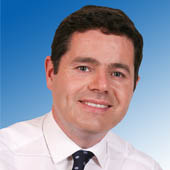The week started with a visit to Scoil Cholmcille in Skryne, Co. Meath to meet the staff and pupils there. Due to diary commitments, I had been unable to visit the school some months before when the students were presenting work they had done on the EU. So I was delighted to be able to call on them this week and to see the projects they had worked so hard on.
There were songs about Picasso (written by one of the students), about Ireland and about what the EU means to us. There was a particularly poignant presentation of ‘The story of the uncreation’ which outlined the global challenges we face. While the story is tragic in itself, it is even moreso when from the mouths of babes, so to speak. The effort expended by the teachers and the children during the course of the morning was immense. The songs were delivered with determination and enthusiasm and the children wholeheartedly engaged in quizzing me on the workings of Government, what my job entails and what the future holds, both politically and socially.
Then it was back to the office where I spent the afternoon preparing for the next two days, which were to be spent in Greece.
The meeting of the EU-Arab League took place in Athens on Tuesday and Wednesday. Being the third Ministerial meeting of its kind, it was attended by 49 States from the two regions. This included countries such as Iraq, Kuwait, Lebanon, Libya, Morocco, Palestine, Qatar and Yemen.
In my contribution, I stressed Ireland’s support for a more regular strategic dialogue between Europe and the Arab League States; reaffirmed the need for all violence and bloodshed to be brought to an end in Syria; and outlined Ireland’s support for a two-State solution to the Arab-Israeli conflict, on the basis of the 1967 borders, which can only be achieved through negotiations. I also welcomed the establishment of the new Palestinian Unity Government and commended the people of Tunisia on the adoption of their new constitution earlier this year.
The meeting also gave me an opportunity to meet with the Egyptian Foreign Affairs Minister, Nabil Fahmy, to discuss the continued detention of Irish citizen, Ibrahim Halawa, in Egypt. Minister Fahmy acknowledged the situation, and expressed hope that progress can be made where Ibrahim is concerned.
A subject that featured prominently in discussions at the meeting over the course of the two days was Syria, due to the continuing traumatic events that are being endured by the people there. The situation in respect of the Arab-Israeli conflict also featured heavily, with a focus being placed on the resumption of talks between the two sides.
The meeting concluded on Wednesday with a Declaration that the EU and the League of Arab States must continue to work together in pursuit of peace and stability within the regions. A Declaration on Iraq was also agreed, following the siege by Sunni Islamist insurgents which saw half a million people fleeing their homes in Mosul, Tikrit and the surrounding area.
By continuing to advance the relationship between the EU and the Arab League States we can work to promote peace and stability and make progress in areas that are of common interest to both, such as crisis response, the empowerment of women, electoral observation, legal cooperation, and the promotion of human rights and civil society. Meetings such as this bring us closer to making these aspirations a reality.
On Thursday I was before the Joint Committee on EU Affairs discussing the Country Specific Recommendations set out for Ireland by the EU Commission. This is part of the European Semester process, of which Ireland is a part. It aims to ensure that all countries are on, and remain on, a sustainable economic path and that the polices that are being pursued are the right ones for our economy and our society. I was also doing some more work on a book that I am launching in Belfast next week. ‘Ireland and the European Union; The dynamics of a changing relationship’ by Mary C. Murphy is an excellent piece of academic work which analyses the relationship between the two.
Friday was spent meeting constituents, hearing about the difficulties they are experiencing and finding out how I can help. I was out meeting the good people of Stoneybatter in the afternoon. This follows on from meeting the people of Willows in Glasnevin earlier in the week.
The weekend ahead looks set to be filled with a number of different school and church events as well as street parties in the area.
I was delighted to see on Wednesday that the first ever Higher Education System Performance Report signalled the success of the higher education system in Ireland. The report measured Ireland’s performance against international benchmarks and showed that Ireland now has the highest level of 30-34 year olds in Europe with third level qualifications. It also stated that our Irish universities are in the top 1% of research institutions in the world across 18 academic disciplines; and that Ireland is first in the world for the availability of skilled labour. Despite the constraint on all sectors of society in recent years, including education, this is a remarkable achievement and one that the entire education sector should be proud of.
This week also saw the coming into force of an EU Directive that will dramatically enhance consumer rights. Its enforcement now places a ban on hidden fees and charges when shopping online, a ban on surcharges and pre-ticked boxes and gives consumers better cancellation rights, as well as the right to withdraw from digital purchases. As our purchasing practices change in response to advances in technology, this legislation will ensure greater protection for online shoppers and is a practical example of the positive role membership of the EU has on our everyday lives.
